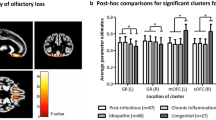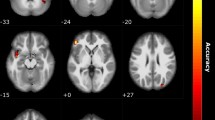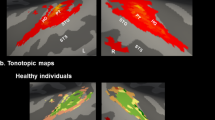Abstract
SUBSTANTIAL anatomical and electrophysiological evidence suggests that human temporal lobe structures are involved in the processing of odour perception. The temporal lobe has both afferent and efferent connections with the olfactory bulb1,2, the major synaptic junction for primary fibres from the olfactory receptors. Olfactory auras accompany epileptic seizures of temporal lobe origin3, and electrical stimulation of the uncus and amygdala in conscious patients elicits odour sensations4. There are, however, no known quantitative studies of olfactory function in patients with surgically verified temporal lobe lesions. The present findings demonstrate that removal of the temporal lobe increases odour detection thresholds (ODT), whereas odour recognition thresholds (ORT) remain similar to those of subjects without brain damage.
This is a preview of subscription content, access via your institution
Access options
Subscribe to this journal
Receive 51 print issues and online access
$199.00 per year
only $3.90 per issue
Buy this article
- Purchase on Springer Link
- Instant access to full article PDF
Prices may be subject to local taxes which are calculated during checkout
Similar content being viewed by others
References
Allison, A. C., Biol. Rev. Camb. Phil. Soc., 28, 195–244 (1953).
Powell, T. P. S., and Cowan, W. M., Nature, 199, 1296–1297 (1963).
Jackson, J. H., Lancet, i, 79–80 (1899).
Penfield, W., Prog. Ass. Res. nerv. ment. Dis., 36, 210–226 (1958).
Crandall, P., Walter, R. D., and Rand, R., J. Neurosurg., 20, 827–840 (1963).
Henkin, R. I., and Bartter, F. C., J. clin. Invest., 45, 1631–1639 (1966).
Wechsler, D., Wechsler Adult Intelligence Scale (Psychological Corporation, New York, 1955).
Wenzel, B. M., in Psychosurgical Problems (edit. by Mettler, F. A.), 107–109 (Blakiston, Philadelphia, 1952).
Elsberg, C. A. in Medical Physics (edit. by Glasser, O.), 821–824 (Chicago Year Book, Chicago, 1944).
Hughes, J. R., et al. in Neurophysiology Studied in Man (edit. by Somjen, G. G.), 260–279 (Excerpta Medica, Amsterdam, 1942).
Narabayashi, H., in Neurobiology of the Amygdala (edit. by Eleftheriou, B. E.), 11–26 (Plenum, New York, 1972).
Halgren, E., Rausch, R., Babb, T. L., and Crandall, P. H., Program, 243 (Society for Neuroscience, 1974).
Macrides, F., in Reports of Research, 32, (Worcester Foundation for Experimental Biology, Shrewsbury, Massachusetts, 1974).
Moulton, D. G., and Tucker, D., Ann. N. Y. Acad. Sci., 116, 380–428 (1964).
Campbell, R. C., Statistics for Biologists (Cambridge University Press, Cambridge, 1967).
Gordon, H. W., and Sperry, R. W., Neuropsychologia, 7, 111–120 (1969).
Author information
Authors and Affiliations
Rights and permissions
About this article
Cite this article
RAUSCH, R., SERAFETINIDES, E. Specific alterations of olfactory function in humans with temporal lobe lesions. Nature 255, 557–558 (1975). https://doi.org/10.1038/255557a0
Received:
Accepted:
Issue Date:
DOI: https://doi.org/10.1038/255557a0
This article is cited by
-
Olfactory Testing in Temporal Lobe Epilepsy: a Systematic Review
Current Neurology and Neuroscience Reports (2020)
-
A Quantitative Meta-analysis of Olfactory Dysfunction in Epilepsy
Neuropsychology Review (2019)
-
An intrinsic association between olfactory identification and spatial memory in humans
Nature Communications (2018)
-
Influences of temporal lobe epilepsy and temporal lobe resection on olfaction
Journal of Neurology (2018)
-
Olfactory impairment in monozygotic twins discordant for schizophrenia
European Archives of Psychiatry and Clinical Neuroscience (2005)
Comments
By submitting a comment you agree to abide by our Terms and Community Guidelines. If you find something abusive or that does not comply with our terms or guidelines please flag it as inappropriate.



